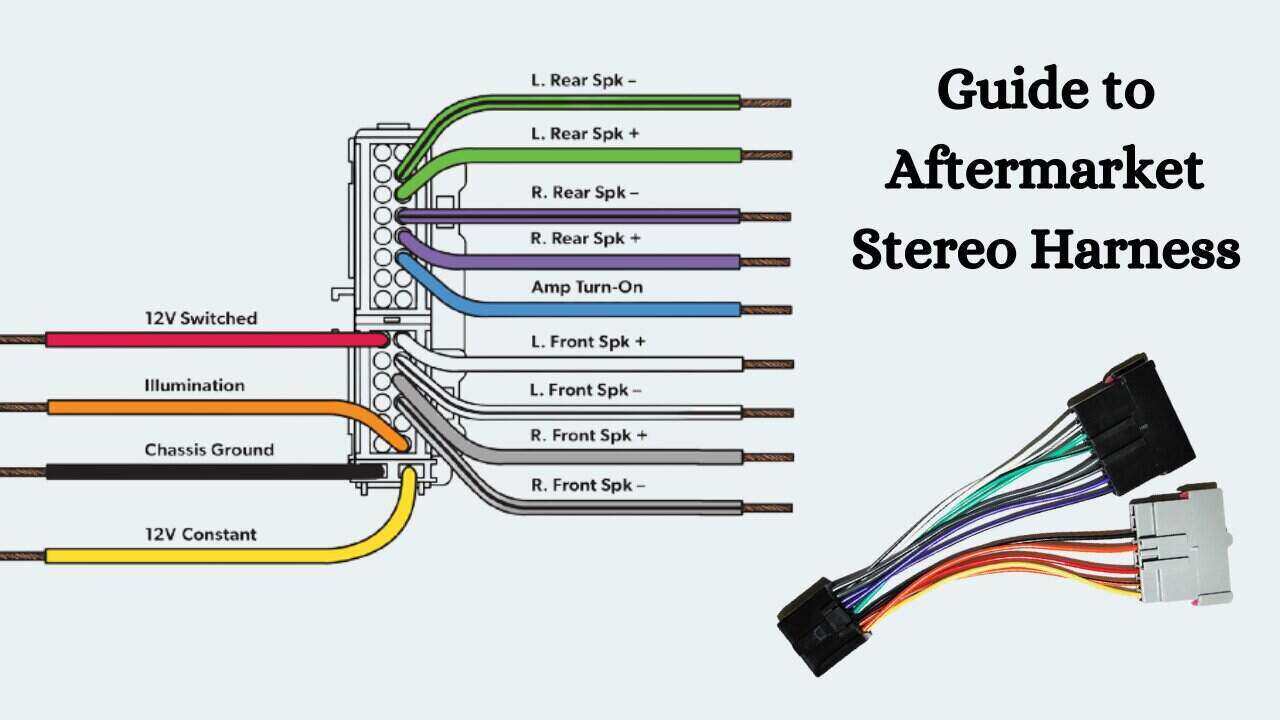Decoding the Blue and White Wire: Your Car Radio Harness Guide
Ever stared at a tangled mess of wires behind your car radio, feeling utterly lost? You're not alone. Car audio wiring can be intimidating, but understanding the role of each wire, especially the often-misunderstood blue and white wire, can transform a daunting task into a manageable project.
The blue and white wire in a car radio harness typically serves as the remote turn-on lead for an amplifier or other powered accessory. This seemingly small wire holds significant power, quite literally. It carries a low-voltage signal that activates your amplifier when you turn on your car radio, ensuring a synchronized audio experience.
Imagine trying to listen to your favorite music only to find your amplifier remains stubbornly silent. This common issue can often be traced back to a problem with the blue/white wire connection. A loose connection, a faulty wire, or even incorrect wiring can disrupt the signal and leave you with a frustratingly quiet ride.
Understanding the function of the blue and white wire is only the first step. Knowing how to identify it within the harness, how to properly connect it to your amplifier, and how to troubleshoot potential problems are crucial for a successful car audio setup. This guide will provide you with the knowledge and confidence to tackle these challenges head-on.
Let's delve into the intricacies of this crucial connection, exploring its history, common issues, best practices, and frequently asked questions to empower you with the knowledge you need for a smooth and successful car stereo installation or upgrade.
Historically, the standardization of wire colors in car audio harnesses simplified installation and reduced confusion. The blue and white wire’s designated function as the remote turn-on lead became a common practice across many car manufacturers. However, variations can still exist, highlighting the importance of consulting your car’s specific wiring diagram.
The blue/white wire is essential for automating your car audio system. Without it, you’d have to manually turn on your amplifier every time you wanted to listen to music, a cumbersome and inconvenient process. This small wire ensures that your amplifier powers on and off in sync with your car radio, creating a seamless listening experience.
A common issue with the blue and white wire is insufficient current to activate certain amplifiers. This can be resolved by using a relay, which allows the low-current signal from the radio to control a higher-current circuit, effectively powering on the amplifier.
One benefit of understanding this wire's function is streamlined troubleshooting. If your amplifier isn't turning on, checking the blue and white wire connection is one of the first steps in diagnosing the problem.
Another benefit is the ability to integrate additional powered accessories. By tapping into the blue and white wire, you can trigger other devices, such as an equalizer or a powered subwoofer, to turn on with your car radio.
Finally, proper blue/white wire management contributes to a clean and organized installation. This not only improves the aesthetics of your car's interior but also makes future troubleshooting and modifications easier.
Advantages and Disadvantages of Standardized Blue/White Wire
| Advantages | Disadvantages |
|---|---|
| Simplified installation process | Potential variations across different car models |
| Reduced confusion due to standardized color coding | Risk of incorrect connection if not verified with wiring diagram |
Best Practices: Always consult your car’s wiring diagram. Use appropriate connectors and ensure secure connections. Test the connection with a multimeter before finalizing the installation. Protect the wire with appropriate insulation or conduit. Consider using a relay for high-current amplifiers.
Troubleshooting Tips: Use a multimeter to check for continuity and voltage. Inspect the wire for any breaks or damage. Verify the connection at both the radio and amplifier ends. Check the radio’s fuse and the amplifier’s power supply.
FAQ: What if my car doesn’t have a blue/white wire? Can I use a different wire? How do I test the wire with a multimeter? What gauge wire should I use for the remote turn-on? What is a relay and when do I need one? What if my amplifier still doesn’t turn on after checking the blue and white wire? Where can I find my car's wiring diagram? What should I do if the blue/white wire is damaged?
Conclusion: The blue and white wire, though seemingly insignificant, plays a vital role in the functionality of your car's audio system. Understanding its purpose, proper connection methods, and potential issues empowers you to take control of your car audio installation. From troubleshooting common problems to integrating new accessories, mastering this small wire unlocks a world of possibilities for customizing your car's audio experience. By following the best practices outlined in this guide and consulting your car's specific wiring diagram, you can ensure a smooth, successful, and enjoyable car audio upgrade. This knowledge not only saves you time and frustration but also allows you to fully enjoy the benefits of a well-integrated and powerful car audio system. So, next time you're faced with that tangle of wires, remember the power of the blue and white wire and approach the task with confidence and knowledge. Don’t be afraid to delve into the intricacies of your car’s audio system; the reward of crystal-clear sound is well worth the effort.
Unlocking musical gold exploring apple musics greatest albums
Is the 66 duramax diesel a worthy powerhouse
Unlocking the secrets of the axis a22 boat market










